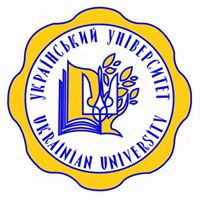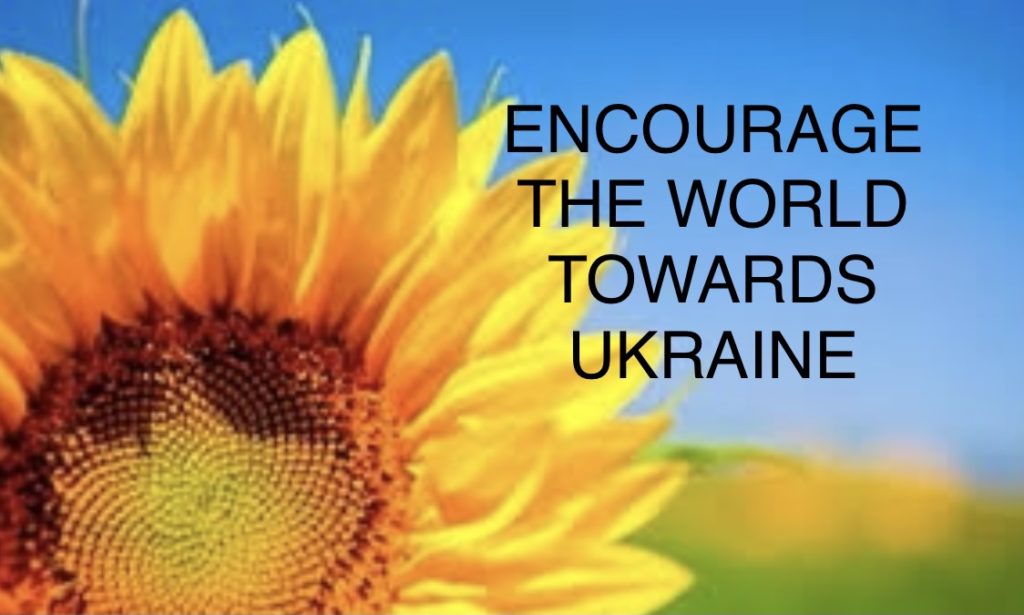
Let’s knock and it will be opened to us!
* * *
Only 58 countries of the world support Ukraine in its resistance to Russian aggression, which is 30% of the UN member states. Eight countries of the “G20” are on Russia’s side… (for details, see: Why so few countries supported Ukraine at the UN — in Ukrainian).
Therefore, there is no ground to talk about global support. And among those countries that support Ukraine, there are those under the powerful influence of Russia (Germany, Hungary, France, etc.).
Let’s try to understand what the essence of the problem is, how the situation can be improved, and what role Ukrainians Worldwide can play in this.
Diplomatic front
Support from the countries of Europe, North America, and Far East Asia is largely due to the leadership role of the United States, Canada, and Great Britain, and the active pro-Ukrainian position of Poland, Estonia, Latvia, and Lithuania, but not by the efforts of Ukrainian diplomacy.
Despite the video addresses of the President of Ukraine Volodymyr Zelenskyy to the UN and the parliaments of various countries around the world and the social media activity of the Minister of Foreign Affairs of Ukraine Dmytro Kuleba, Ukrainian diplomacy cannot boast of victories even in small battles on the diplomatic front. There is nothing to even say about victories at the tactical and even more so the strategic levels.
The reason for this, obviously, is that V. Zelenskyy, to whom the diplomatic corps of Ukraine is subordinate, has monopolized the diplomatic space with his “videos”, who often use fair rhetoric, but mostly lose due to emotional and expressive expression.
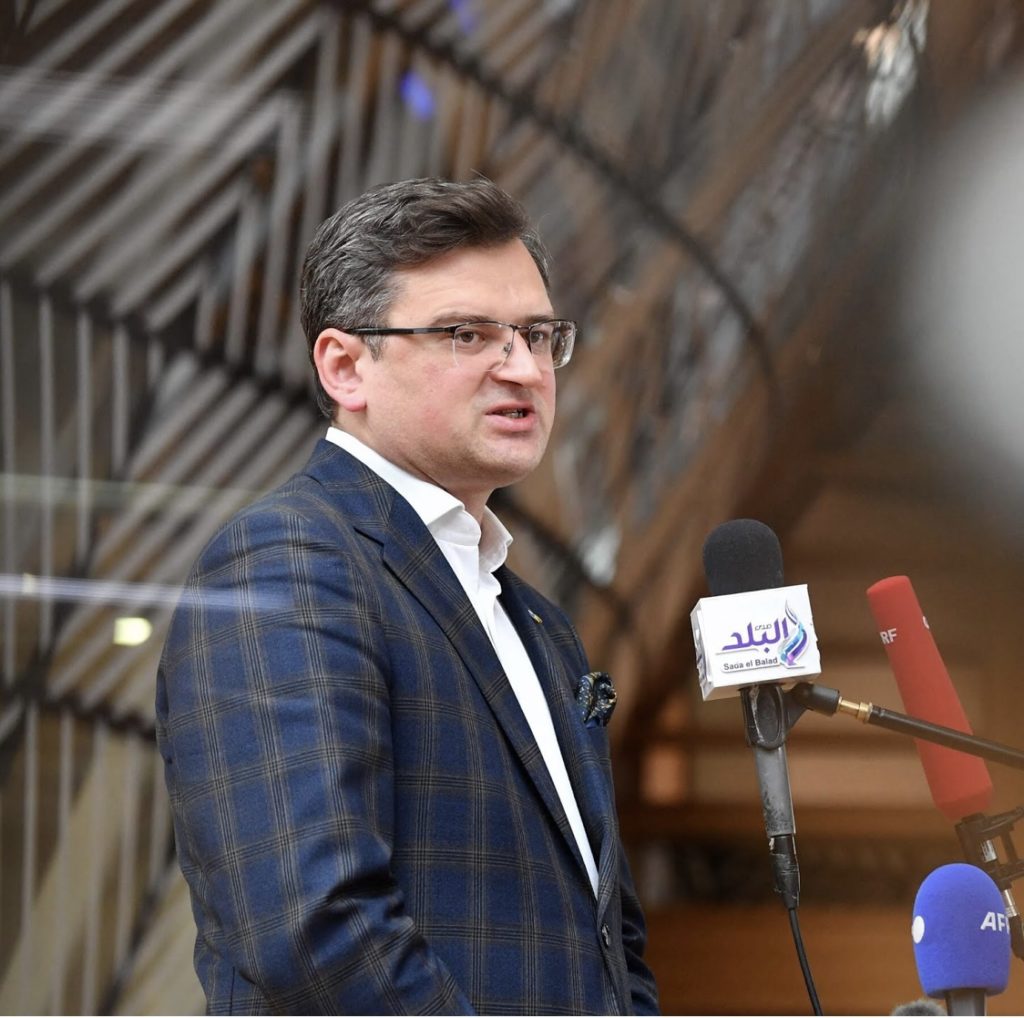
Minister of Foreign Affairs Kuleba would travel around the world visiting particularly difficult and problematic countries (Brazil, India, China, etc.) with the aim, if not of attracting these countries to support Ukraine, at least of neutralizing them in their relations with Russia. Unfortunately, D. Kuleba is limited to trips mainly to the countries of the European Union and the USA. And he would go on tour in Asia, Africa or South America…
The high-quality composition of the diplomatic corps, especially extraordinary and plenipotentiary ambassadors, leaves much to be desired. It is worth mentioning at least one name of the ambassador who, by his activity together with the team of the diplomatic mission headed by him, would encourage a country indifferent to Ukraine, neutral (not necessarily neutral in terms of official status) to support Ukraine, and a pro-Russian country — at least to neutrality, non-support of the Russian Federation in its war against Ukraine. There are none of these examples!
Instead, we hear and read about cases of, to put it mildly, undiplomatic behavior of individual ambassadors, which brought nothing but harm to Ukraine.
Unfortunately, most ambassadors of Ukraine simply enjoy a peaceful life, stay in their countries of residence or engage in activities that are far from diplomacy and their functional duties. A lot of such ambassadors sit on the tail of my colleagues in social networks, so we are able to monitor their activities, their interests, etc. A sad impression…
It is not noticeable at all in the diplomatic space and any activity of such an important, especially in wartime, division of diplomacy, as ambassadors on special assignments, as special envoys. In this role, the most experienced Ukrainian diplomats, former ambassadors to the respective problematic countries and, of course, former ministers of foreign affairs, as well as former presidents of Ukraine, should be used.
I am convinced that it is on the diplomatic front that ex-presidents P. Poroshenko (a professional diplomat and a former minister of foreign affairs), V. Yushchenko and even L. Kuchma (by the way, where is he now?) could do a lot for Ukraine in this difficult time.
Or take former ambassadors… I will give only one example: Armenia does not support Ukraine and is one of the allies of the Russian Federation. I am more than sure that the involvement of the former ambassador of Ukraine to Armenia, Oleksandr Bozhko, in shuttle diplomacy as a special envoy or ambassador on special assignments would have a noticeable impact on Armenia’s position. I confirm this, having known O. Bozhko for dozens of years.
The only problem is that instead of turning political opponents into allies and allies on the diplomatic front, V. Zelenskyy turns them into enemies. It seems that the personal loyalty of the “Kvartal 95” group is much more important to him than the fate of Ukraine.
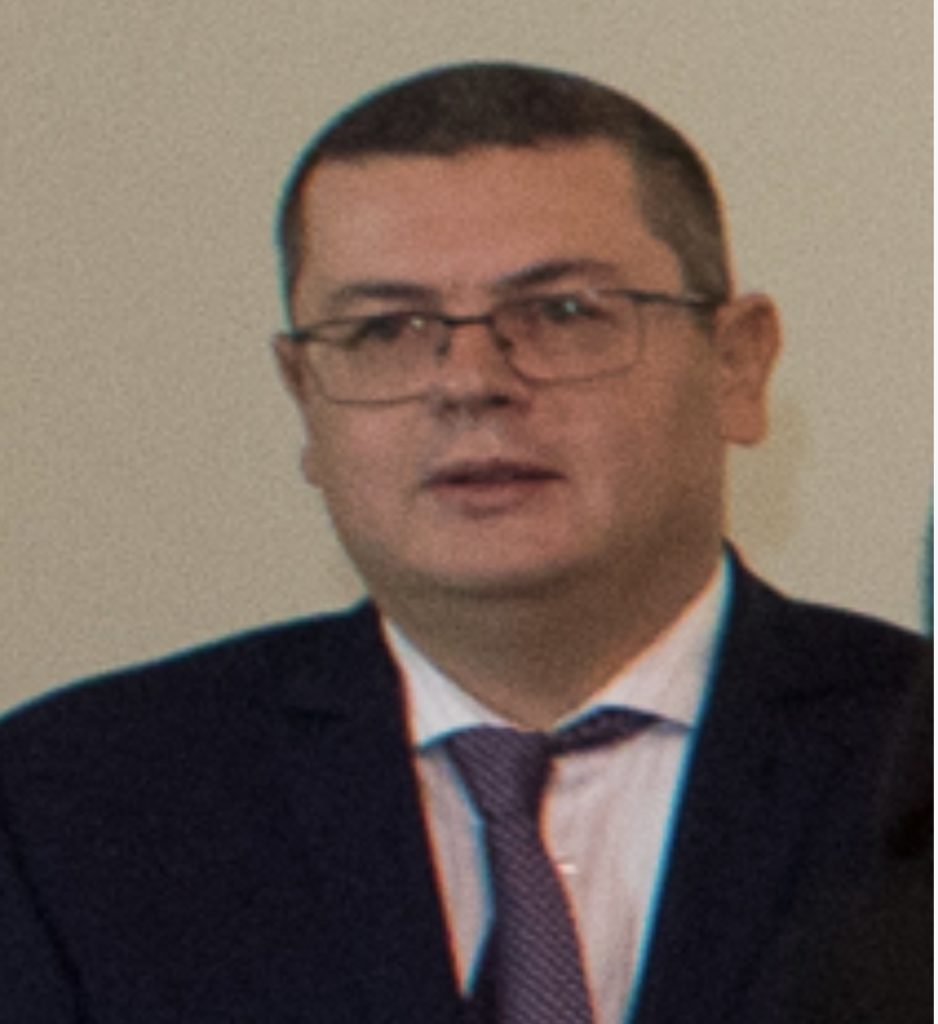
It should be added here that the Verkhovna Rada of Ukraine Committee on Foreign Policy and Interparliamentary Cooperation, headed by Doctor of Laws and Professor Oleksandr Merezhko (pictured), does not show itself in the diplomatic circle. Here is the list of Committee members: Mykhailo Ananchenko, Marina Bardyna, Solomiya Bobrovska, Svyatoslav Vakarchuk, Iryna Gerashchenko, Maria Ionova, Yuliya Lyovochkina, Hryhoriy Nemyrya, Olga Rudenko, Olena Khomenko, Svyatoslav Yurash, Elizaveta Yasko.
For this specialized Committee, an unlimited field of activity opens up through cooperation with the legislative bodies of countries that require special attention from the point of view of the topic discussed by us. Given the personal composition, however, the success of these legislators in the diplomatic field will be doubtful. And that should be a cause for concern as well.
And the last. As a consequence of the above, Ukraine remains uninitiative in the diplomatic space. Let me remind you that the meetings of the UN Security Council on issues related to Russia’s war against Ukraine were not initiated by Ukraine, but by… the aggressor country itself. Paradox?
Oh no! Back in 2014, Ukraine should have initiated the convening of a summit of the signatory countries of the Budapest Memorandum. This was not done, and the reason was the political leadership of Ukraine. In my opinion, the relevance of this summit remains. And not only because of Russia’s violation of the Memorandum eight years ago, but also in connection with the current nuclear blackmail by Russia.
And also — from the format of the Budapest Memorandum, in my deep conviction, the initiative of Helsinki-2 — the revision and renewal of the Treaty on Security and Cooperation in Europe and — I would add — in the whole world — should come out, which I have written about before (more here: Budapest format: Collection of articles and notes. — Washington, 2020. — 294 p. — in Ukrainian).
Information front
To an even greater extent than on the diplomatic front, Ukraine loses on the informational front. I have already written much more, longer and more often on this topic as an expert in the field of journalism, mass media, counter-propaganda and special propaganda (more here: Ukrainocentrism, journalism and the media system: Collection of articles and notes. — Washington, 2020. — 449 p. — in Ukrainian).
On the basis of everything I wrote earlier, unfortunately, I can state: Ukraine is losing catastrophically in the information space, and in both internal and external directions.
Starting with the liquidation of the Medvedchuk-Kozak pro-Russian TV channels, and continuing with the banning of other oligarchic channels (also generally pro-Russian), the current government of Ukraine created a semblance of something new, which in a strange way warmed to Ihor Kolomoiskyi’s TV channel, employing almost all pro-Russian journalists and media managers from the former resources of the same Medvedchuk-Kozak, Akhmetov, etc.
A Ukrainocentric mass media system, or at least a hint of it, was never created. This topic is not even discussed in society, in the journalistic and media environment, and even in journalistic science.
One of the complete failures in President Zelenskyy’s information policy was the Dom TV channel. This TV channel did not exert a Ukrainocentric influence on the territories of Ukraine occupied by Russia since 2014. It did not become a powerful resource for resisting Kremlin propaganda and broadcasting to a Russian audience, where Yevgeniy Kiselyov, Savik Shuster, Aleksandr Nevzorov, well-known in Russia, and, eventually, the Ukrainian Dmitry Gordon and others like him could show their counter-propaganda talents. Instead, Dom turned out to be a modern reincarnation of provincial Soviet television.
To no extent did the Ukrainian media appear on the wider horizons of foreign language. Thanks to the efforts of the newly elected president, the English-language Ukraine Today TV channel based on the Internet, which started well a few years ago, rested safely in God. And now, in the time of a full-scale war, it would be very useful in promoting the Ukrainian topic in the world information space. Of course, Ukraine Today would be unequal to the Kremlin’s RT (Russia Today), but still better than nothing…
Recently, we have noticed new phenomenas created for work through social networks — Ukraine.ua, We are Ukraine, Stand With Ukraine, etc. Pursuing a purely cognitive goal, and even then on a basic annual basis, devoid of analytics and deep roots in Ukrainian studies, these resources reach a small audience (9 to 37 thousand users follow them on multimillion-member LinkedIn), mostly of Ukrainian origin, and Ukrainian weather in the global information space is not are doing.
As far as we know, Ukraine does not cooperate with the mass media of the Ukrainian diaspora, which has many print publications, television and radio studios, and Internet-based information and analytical resources, in particular, in countries that are problematic in terms of supporting Ukraine. In their majority, these diaspora mass media are designed for the diaspora itself and, with rare exceptions, do not exert any influence on the broad circles of the local public. So there is something to think about both in Ukraine and in Ukrainian diaspora.
Ukrainians Abroad
Separately, it is worth considering what kind of support Ukrainians abroad, and above all, the diaspora, provide to Ukraine. Historically, it was the diaspora that largely influenced or determined the politics of countries with numerous Ukrainian communities. Examples: Canada, USA, Great Britain, Germany, etc.
In connection with Russia’s aggression against Ukraine since 2014, we are observing a significant activation of diaspora organizations and groups that were not even noticed before. The Russian Federation’s large-scale war in Ukraine literally stirred up the diaspora. To the greatest extent, the activity of the diaspora manifested itself and continues to manifest itself in the collection of funds and humanitarian aid to Ukraine. A huge number of representatives of the autochthonous population of the respective countries joined these actions, and this is certainly pleasing.
A not so optimistic picture emerges in another, perhaps even more important area — in the social and political pressure on the executive and legislative authorities in foreign countries with large Ukrainian diasporas.
Thus, Ukrainian diaspora organizations and groups of activists or even individual activists organized and are organizing various kinds of protest events — picketing, demonstrations, meetings, etc. A lot of these events were organized in many countries of the world, but, unfortunately, they turned out to be ineffective.
For example, we hoped that with the beginning of Russia’s large-scale war in Ukraine, there would be thousands of long-lasting protests in front of Russian embassies in various countries around the world. We called on Ukrainians abroad to show their activity and were ready to coordinate these events.
It’s sad to state, but you can’t take the words out of the song: the protest events organized by Ukrainians were not crowded and practically did not reach the general public of the respective countries. The reason was that event organizers and coordinators, ignoring our recommendations, arranged flash mobs, staging and just crowded scenes on the street for the sake of entertainment (“to have fun”, as one of the UCCA leaders put it). And some events turned into self-promotion of the organizers themselves.
One ambitious activist, who years ago set himself the goal of rallying a million Ukrainians in support of Ukraine, refusing to cooperate with others, rushed to a social network group of 50,000 people. During a recent event he organized, he promised to bring 25,000 people to the streets, but perhaps only 25 turned out, as evidenced by the photo he shared on the networks.
From the sad experience of demonstrations in support of Ukraine, we can name the Ukrainian events in Berlin, Germany, where they faced much more numerous and powerful events of pro-Russian forces. The latter continue to promote anti-Ukrainian sentiments in German society, and the Ukrainian diaspora in Germany has reduced its activity and does not fight for Germany to remain a consistent ally of Ukraine.
Our greatest concern is the extremely low activity or inactivity of Ukrainian communities in problematic countries, that is, in countries that do not support Ukraine and closely cooperate with Russia.
For example, Brazil historically had and still has one of the largest Ukrainian diasporas. Unfortunately, we do not even observe the efforts of the local Ukrainian community to unite, promote a pro-Ukrainian agenda in Brazilian society and put pressure on the government and parliament of Brazil to encourage them to support Ukraine or at least to weaken cooperation with Russia.
Immigrants from Ukraine make up almost the largest percentage in the society of the State of Israel. Of course, most of them do not consider themselves the Ukrainian diaspora in Israel, but this in no way cuts off their Ukrainian roots. Despite all this, Israel is among the states that do not support Ukraine — neither formally (by statements) nor actually (by providing appropriate material or financial aid). As in Germany, there is a strong pro-Russian lobby. And Russian propaganda drove anti-Semitism deep into the brains of Ukrainians, who in the 2019 elections elected a pure-blooded, one-hundred-percent Jew as president “thanks” to their “anti-Semitism.”
It is noteworthy that the World Ukrainian Congress, which positions itself as an organizer and coordinator of public activities in the Ukrainian diaspora and in the face of more than 20 million Ukrainians abroad, did absolutely nothing, is not doing, and has no intention of doing at least something in those countries of the world where Ukrainians live compactly and who do not support Ukraine in its fight against the Russian aggressor.
However, what results with the participation of the UWC can be expected in such countries as Mexico, Brazil, India, Vietnam or China, when even in countries with the most powerful diaspora organizations (Canada and the USA), having close contacts with the executive and legislative powers, but having crippled itself with worthless flash mobs, “inspector” tours (in particular, as part of accompanying politicians) and drafting numerous statements with concerns, the WUC failed to get the governments of Canada and the USA to recognize the Russian Federation as a terrorist state or a state sponsor of terrorism.
What can we say about similar work in Germany or France, if the leaders of the UWC lacked the courage, spirit or wisdom to add their signatures to the appeal already signed by hundreds of people from 30 countries of the world (not only Ukrainians!) initiated by another organization — Ukrainians Worldwide Movement, in which the call to recognize Russia as a terrorist state is included as the very first demand. It seems that these people are only interested in Ukrainian orders, parties and buffets, but not in the fate of Ukraine.
The Ukrainian government, regardless of whether it is headed by Yanukovych, Poroshenko or Zelenskyy, is quite satisfied with cooperation with such undemanding partners.
This insidiousness of nomenclatura diaspora organizations in relation to Ukraine, their vain flirting with Ukrainian and foreign politicians, prompted us to look for new ways and means of consolidating Ukrainian society and Ukrainians abroad into the driving force of Ukrainian state-building (more here: Ukrainians Worldwide — the driving force of systemic changes in Ukraine: Collection of articles and notes. — Washington, 2020. — 309 p. — in Ukrainian).
These searches crystallized into the idea of the Ukrainians Worldwide Movement. In Ukraine and on all continents, in all countries of the world, where there is at least one Ukrainocentric Ukrainian, we will be as active as possible in working for the good of Ukraine and for the success of the Ukrainian cause.
Religious front
Despite the fact that in all civilized countries of the world the church is separated from the state, Ukrainian churches play a prominent role in the processes of Ukrainian nation-building and state-building.
The return of Ukrainian Orthodoxy under the omophorion of the Ecumenical Patriarch inspired hope for the creation of a single Ukrainian Orthodox Church with the Kyiv Patriarch at its head. This issue can and should be solved systematically — once and forever. But Ukrainians would not be Ukrainians then, for whom it is more important to act situationally and to go to the goal as long as possible.
The unification of Ukrainian Orthodoxy did not happen. First of all, the process went wrong in Ukraine: the Orthodox Church of Ukraine did not unite the Orthodox in Ukraine, since the UOC MP was never liquidated — if not by deregistration for extremist activities (for this there is more than enough, grounds, — only political will would be required) or re-registered as a part (branch) of a foreign church organization — ROC MP in Ukraine (such a decision also requires only political will).
The second problem is the acquisition of the status of a metropolis, not a patriarchy. This became a formal reason for Patriarch Filaret’s demarche. Delving into this problem is not so important at the moment.
There is also a third problem, which was caused by the Ecumenical Patriarch himself and which is obviously connected with the second. OCU, as a metropolis of the Ecumenical Patriarchate, is known to be limited in its activities exclusively on the territory of Ukraine. Therefore, the Ukrainian Orthodox abroad, although it is under the omophorion of the same Ecumenical Patriarch, was not united into one church with Ukraine. And this contradicts the aspiration of Orthodox Ukrainians, who already in 1990, having elected Metropolitan Mstyslav as the patriarch of the UAC, declared their desire to have a single Ukrainian Local (Pomisna) Church.
The name used above is not my invention. This is one of the options for the name of the church, which was dreamed of not only by Ukrainian Orthodox, but also by Ukrainian Catholics. After all, it was assumed that Ukrainian Greek Catholics, i.e. Catholics of the Eastern Rite, would eventually return to the bosom of the Ukrainian Local Church.
Now such a situation has developed that it is almost impossible to predict what will come out of all this. Why? You can, of course, nod at the “hand of Moscow”, which certainly contributed to all this. But I would place the greater blame on thoughtless, short-sighted and vain Ukrainian politicians and church leaders.
Russia’s war in Ukraine just revealed their mistakes, and possibly their crimes. The UOC-MP is one of the war criminals in this war, but even the obviousness of this fact does not motivate the authorities in Ukraine, based on military necessity, to ban this criminal organization.
It is not only the “indecisiveness” of the “servants of the people” with the president of Ukraine at the head that is surprising here. It is also surprising that the heads of the OCU (Metropolitan Epiphany) and the UGCC (Supreme Archbishop Sviatoslav) did not bury him with the Metropolitan Onufriy of the UOC MP in St. Sophia of Kyiv on Independence Day of Ukraine.
The same indecipherability of the leaders of the Ukrainian churches was once again manifested in their attitude to the fact that the Pope of Rome recently expectedly and unexpectedly spoke publicly about Russia’s war in Ukraine, taking the side of… Moscow, thereby putting a massive cross on his holiness.
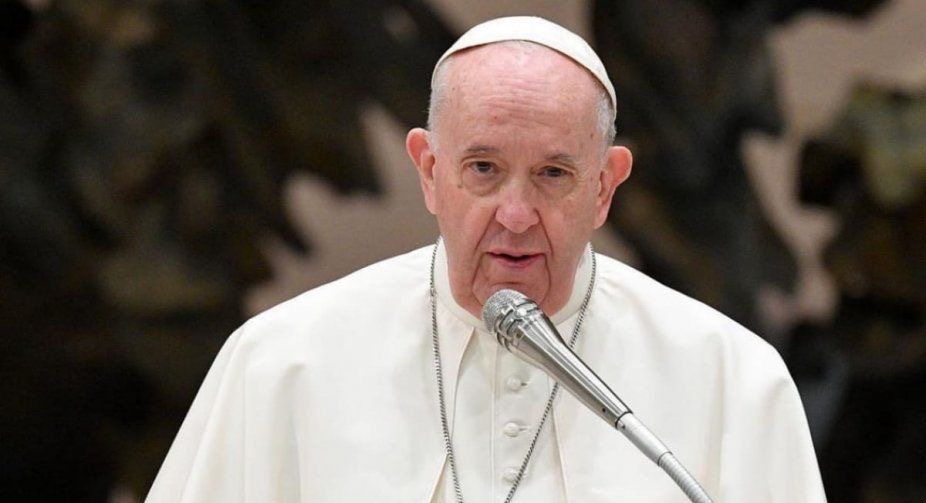
Find out about the reaction of the leaders of the Ukrainian Orthodox and Greek Catholic churches to the Pope’s statement. All abstained, considering the right of the Pope to be infallible.
The leadership of the UWC, which are predominantly Greek-Catholic by faith, have, to their credit, expressed concern, and that’s a good thing. The Orthodox believers reminded that Pope Francis sinned in his youth by being interested in Marxism, later repented and moved away from Marxism, but Marxism did not move away from him. Other Orthodox believers reminded that Putin keeps his money in the Vatican bank, and in this way the Pope bought by the Kremlin simply cannot think otherwise. Although, as a state, the Vatican, as a sign of solidarity with the countries of the European Union, should introduce sanctions against the Russian Federation in general and against Putin in particular, imposing an arrest on Putin’s dollars or euros…
Now is not the time to even dream that this situation will encourage Ukrainian Greek Catholics to mass transfer from the jurisdiction of the Vatican to the bosom of the OCU and together with their Orthodox brothers and sisters create the Ukrainian Local Church. Such a church would certainly contribute to the unification and cohesion of world Ukrainians around the creation of a successful and flourishing Ukrainian State.
But I really want Ukrainian churches abroad, in addition to prayers and humanitarian aid to Ukraine, to take an active part in measures to strengthen the influence of the Ukrainian diaspora on the governments and parliaments of their countries of residence in order to maximize the number of countries that support Ukraine in its struggle against Russia aggression.
This is quite easy to do. Notify members of your community only about the opportunity to add your signature to the APPEAL BY REPRESENTATIVES OF UKRAINIANS WORLDWIDE & PEOPLE ALL OVER THE WORLD WHO SUPPORT UKRAINE & UKRAINIANS IN THEIR WAR AGAINST RUSSIAN AGGRESSOR.
The more we send these Addresses to the heads of government and parliamentarians of the countries where the Ukrainian diaspora lives, the more we will be able to influence the process of transforming these countries into supporters of Ukraine.
Shipping of grain as a lesson
The recent establishment of Ukrainian grain exports to consumer countries through the mediation of Turkey and the UN can hardly be called a victory on the grain (bread) front. It was an agreement (and in the sense that stylistically manifests itself in the Russian “deal”) concluded between the departments of Ukraine, Russia, and Turkey, which would certainly not have sat at the negotiating table under other conditions.
The UN was concerned about the threat of famine in countries that cannot live without Ukrainian bread and did not sympathize with the fate of Ukraine at all, did not even condemn Russia’s aggression against Ukraine.
Diplomacy watched the process from the sidelines. Public opinion was restrained and controversial. I remembered someone’s suggestion that it would not be Ukraine, Turkey and the UN that would ensure and ensure the export of grain from Ukraine, but the importing countries themselves.
In this context, it is interesting to see which of the importing countries of Ukrainian grain support Ukraine, and which do not. We could not find a complete list of grain importers from Ukraine. Here are the 20 largest consumers of Ukrainian bread as of 2016: Egypt, Spain, China, Saudi Arabia, Thailand, Italy, Indonesia, the Netherlands, Bangladesh, Israel, Tunisia, Korea, Libya, Portugal, the Philippines, Iran, Morocco, Lebanon, Germany, Syria. You can see how much Ukrainian bread the named countries eat in the table:
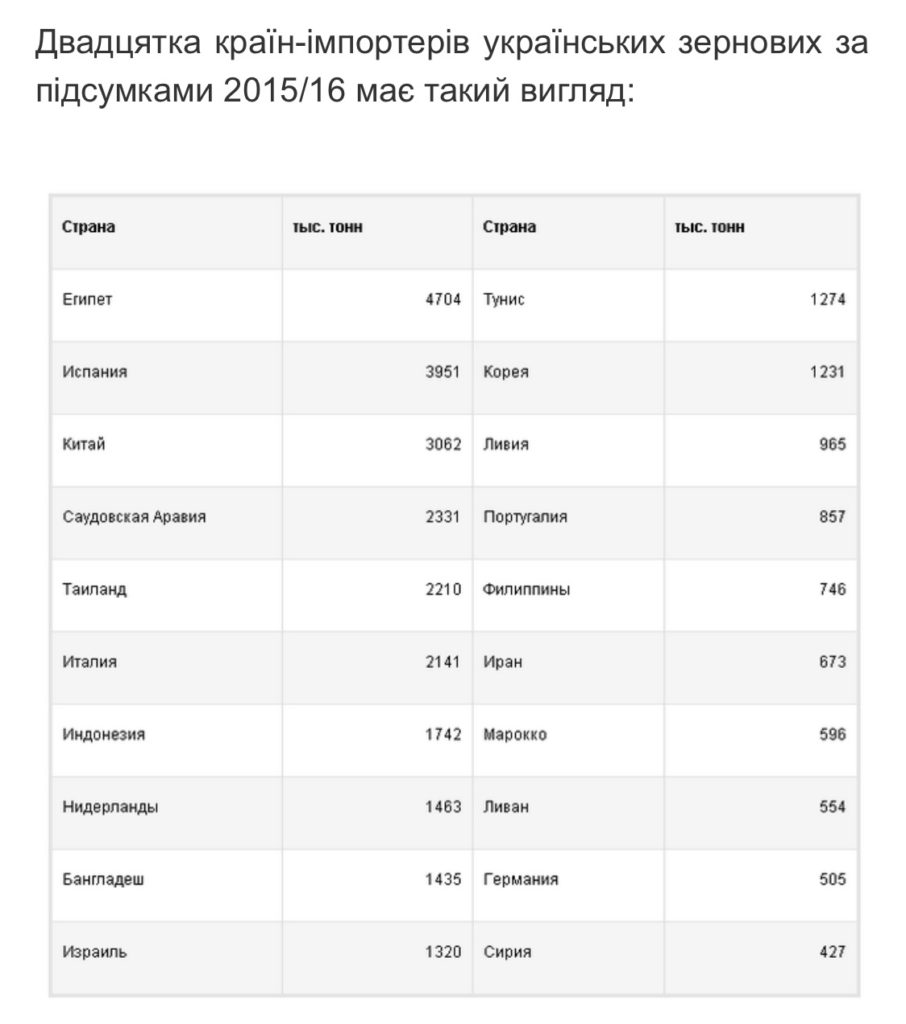
Let us highlight from this list the countries that support Ukraine in the war imposed on it by Russia: Spain, Italy, the Netherlands, Korea, Portugal, Germany. Six countries, i.e. 30%.
The remaining 14 countries eat Ukrainian bread, but side with Russia (China, Iran, Syria) or watch with cold indifference (Egypt, Saudi Arabia, Thailand, Indonesia, Bangladesh, Israel, Tunisia, Libya, Philippines, Iran, Morocco, Lebanon), how the Russian Federation is turning Ukraine into a ruin.
It would seem that why the president and the diplomatic corps of Ukraine would not become more active in this direction? This is probably not the only example that suggests the direction of action for the president and government of Ukraine, as well as for the mass media and various international organizations and organizations of the Ukrainian diaspora that care about the fate of Ukraine.
Pay attention to the statistics of the signatories of our Appeal. In the list of countries represented by the signatories, you can see the names of countries that do not support Ukraine, but in those countries there are people (and they are mostly not Ukrainians!) who signed our rather radical Appeal. So, in these countries there is someone to work with to change the position of the respective states in favor of Ukraine.
Of course, it is not easy to do, but it must be done. Flash mobs, stagings, repainting of flag colors, festivals and other entertainment events are unlikely to serve this purpose. It is necessary to knock on the door of the politicians of these countries. So, let’s knock and it will be opened to us!
Volodymyr Ivanenko
Ukrainians Worldwide Movement Organizing Committee,
Ukrainian University Club
August 30, 2022
Ukrainian version:
